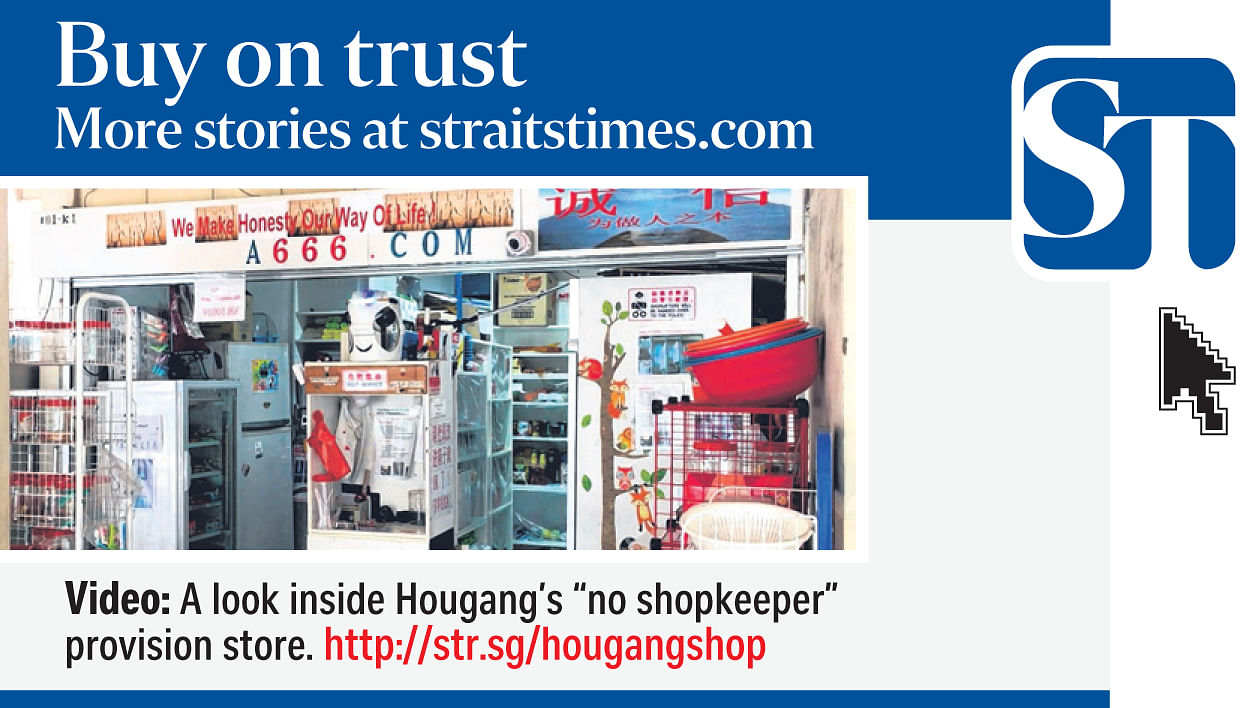Provision shop runs on honesty of its customers
Owner cuts manpower cost with self-service cash register, CCTV cameras at unmanned store
Sign up now: Get ST's newsletters delivered to your inbox
Melissa Lin
Follow topic:
In the void deck of a Housing Board block in Hougang is a provision shop but, unlike others, no one mans it.
A handmade cash register at the front of the shop displays instructions on how to pay for items: check the price tag, show it to any one of the shop's eight closed-circuit television (CCTV) cameras, and place the money into a slot.
To get change, press buttons on the register and $1 or 10-cent coins will fall, one at a time, through a plastic tube and into a container on the machine.
The "no shopkeeper" store at Block 242, Hougang Street 22 is owned by Mr Alex Song, 54, who runs a clothing shop in town. He got into the provision shop business in June last year "with no experience", he said.
Within the first three months, he had figured out why many provision shops struggle to survive. It was difficult to hire shopkeepers he could trust and suppliers were charging him a high price, he said.
"The cost price of my items was sometimes higher than the retail price at supermarkets," Mr Song told The Straits Times at his Hougang shop yesterday.

Supermarkets get to leverage economies of scale as they buy in bulk.
To cut manpower costs, the former air force technician fashioned his own self-service cash register, at a cost of less than $200, out of wood, plastic and metal, with four CCTV cameras as its "eyes".
If customers encounter any problems, such as insufficient change, they can reach Mr Song. His phone number is displayed in the shop.
He tested his system by placing a small amount of sweets and biscuits for sale at the front of the shop, and closed the rest.
"At first I was worried that when I returned at night, I would see an empty shop," he said with a laugh.
Bit by bit, he opened more of his shop - which at about 20 sq m is about half the size of a two-room flat - and added four more CCTV cameras to cover blind spots. The cost of the eight cameras set him back by about $1,000.
He estimated that thieves strike about twice a month, causing losses of about $50 per month, which pales in comparison with the $1,500 it would cost to hire a shopkeeper.
Photographs of thieves, captured by his CCTV cameras, are plastered around the store. "After I put up the photos, some actually came back to return me money and apologise, so I let it slide," said Mr Song.
Once, three children, all siblings, stole food and drink worth over $10. "The cameras caught them very clearly. After I put up their photos, their mother took them to my shop to apologise and pay me back. She was sad and cried," he said.
"It woke the kids up. A few days later, they wrote a letter to me to apologise."
In another case, a man pretended to pay for a can of luncheon meat at the register but blocked the camera with his head. He did not realise that another CCTV camera in front of the register caught him putting the coins into his mouth instead. The man still hasn't contacted Mr Song.
Housewife Diana Yusof, 35, said the concept was "interesting", but the block's resident does her grocery shopping at the supermarket.
Her neighbour, Madam Yeo Y. E., 69, said she would occasionally buy sundries from the shop. "I think the self-service register is a very smart idea. Provision shops are convenient for old people like me as we don't have to walk so far to buy a few things," she said.
Mr Alan Tay, chairman of the Singapore Mini Mart Association, agreed that finding trustworthy shopkeepers is a challenge. As for Mr Song's system, he said: "I think we haven't reached the standard of say, the Japanese, when it comes to being honest and disciplined."
Meanwhile, Mr Song is looking for a new location. "I'm not making money, not because of the system but because of the poor crowd. But I'll bring the system along with me to the next location," he said.

